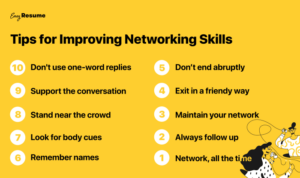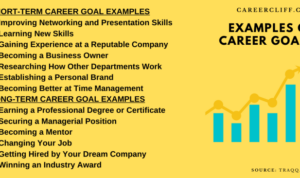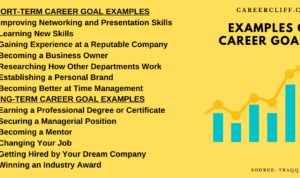Career Advancement Tips: Climb the Success Ladder with Pro Strategies unravels the secrets to elevate your career game to the next level, offering a roadmap to professional success that’s both practical and inspiring.
Whether you’re a seasoned professional or just starting out, these tips will equip you with the tools and mindset needed to thrive in today’s competitive job market.
Importance of Career Advancement
In today’s fast-paced world, career advancement plays a crucial role in professional growth. It is not just about climbing the corporate ladder but also about personal development, job satisfaction, and financial stability.
Increased Job Satisfaction
- Opportunities for growth and learning new skills can lead to a sense of fulfillment in your career.
- Being recognized and rewarded for your hard work can boost morale and job satisfaction.
- Advancing in your career often means taking on more challenging and interesting tasks, keeping you engaged and motivated.
Impact on Financial Stability
- Career advancement usually comes with salary increases and bonuses, improving your financial situation.
- Higher positions often offer better benefits and perks, contributing to overall financial security.
- Advancing in your career can open doors to new opportunities and higher-paying roles, ensuring long-term financial stability.
Setting Career Goals

Setting career goals is essential for achieving success in your professional life. By following the SMART (Specific, Measurable, Achievable, Relevant, Time-bound) criteria, you can create goals that are clear and actionable. It’s important to align your career goals with your personal values and interests to ensure that you are working towards something that truly matters to you. Tracking your progress towards your career goals is also crucial to stay motivated and make adjustments as needed.
Tips for Setting SMART Career Goals
- Specific: Clearly define what you want to achieve in your career.
- Measurable: Set criteria to track your progress and determine when you have achieved your goal.
- Achievable: Make sure your goals are realistic and within reach based on your current skills and resources.
- Relevant: Ensure that your career goals align with your values, interests, and long-term aspirations.
- Time-bound: Set a deadline for achieving your goals to create a sense of urgency and focus.
Aligning Career Goals with Personal Values and Interests
It’s crucial to consider what truly matters to you when setting career goals. Your goals should reflect your values, passions, and interests to ensure that you are working towards a fulfilling and meaningful career. Take the time to reflect on what motivates you and what you are passionate about in order to set goals that resonate with who you are.
Strategies for Tracking Progress Towards Career Goals
- Regularly review and assess your progress towards your career goals.
- Break down your goals into smaller milestones to make tracking progress more manageable.
- Celebrate achievements along the way to stay motivated and encouraged.
- Adjust your goals as needed based on feedback and changing circumstances.
Skill Development for Career Advancement
Developing key skills is crucial for advancing in various industries. Continuous learning and upskilling are essential in today’s competitive job market to stay relevant and progress in your career. Here we will discuss the importance of acquiring new skills and share resources and methods to help you advance in your chosen field.
Key Skills for Career Advancement
- Effective Communication: Strong communication skills are vital in almost every industry. Being able to convey ideas clearly, listen actively, and collaborate with others is key.
- Problem-Solving Abilities: Employers value individuals who can think critically, analyze situations, and come up with innovative solutions to challenges.
- Adaptability: The ability to adapt to changing work environments, technologies, and market trends is crucial for career growth.
Continuous Learning and Upskilling
- Attend Workshops and Seminars: Participating in workshops and seminars can help you stay updated on industry trends and acquire new skills.
- Online Courses and Certifications: Platforms like Coursera, Udemy, and LinkedIn Learning offer a wide range of courses to enhance your skill set.
- Mentorship Programs: Engaging with experienced professionals can provide valuable insights and guidance for skill development.
Resources for Acquiring New Skills
- Networking Events: Attending industry events and networking with professionals can open up opportunities for skill development.
- Professional Associations: Joining industry-specific associations can provide access to training programs and skill-building resources.
- On-the-Job Training: Take advantage of on-the-job training opportunities to learn new skills and gain practical experience.
Networking for Career Advancement: Career Advancement Tips
Networking plays a crucial role in advancing one’s career by providing opportunities to connect with professionals in your field, learn about job openings, and gain valuable insights and advice. Building and maintaining a professional network can open doors to new opportunities and help you stay updated on industry trends.
Tips for Building and Maintaining a Professional Network
- Attend networking events: Make an effort to attend industry conferences, seminars, and workshops to meet new people and expand your network.
- Utilize online platforms: Join professional networking sites like LinkedIn to connect with professionals in your field, share insights, and stay connected.
- Follow up: After meeting someone at a networking event, be sure to follow up with a thank you email or message to maintain the connection.
- Offer help: Be willing to help others in your network by offering your expertise or connections when needed.
Benefits of Networking Events, Conferences, and Online Platforms
- Job opportunities: Networking can help you uncover hidden job opportunities that are not advertised publicly.
- Knowledge sharing: By networking with professionals in your industry, you can gain valuable insights, advice, and best practices.
- Mentorship: Building a strong network can lead to mentorship opportunities, where experienced professionals can guide you in your career.
- Professional growth: Networking can help you expand your skills, knowledge, and connections, leading to overall professional growth and advancement.
Seeking Mentorship and Guidance

Having a mentor can significantly benefit your career advancement by providing valuable insights, guidance, and support along the way. Mentors can offer advice based on their own experiences, help you navigate challenges, and push you to reach your full potential.
The Benefits of Having a Mentor
Mentors can help you set realistic career goals, develop new skills, expand your network, and make informed decisions. They can also provide emotional support, encouragement, and motivation during tough times.
- Offering valuable industry knowledge and expertise
- Providing constructive feedback and advice
- Helping you build confidence and self-awareness
- Introducing you to new opportunities and connections
Finding and Approaching Potential Mentors, Career Advancement Tips
When seeking a mentor, look for someone who is experienced in your field, shares similar values, and is willing to invest time in your development. Approach potential mentors professionally, clearly communicate your goals and expectations, and be open to feedback and guidance.
- Attend industry events and networking functions to meet potential mentors
- Reach out to professionals in your field through LinkedIn or other networking platforms
- Ask for introductions from colleagues, friends, or professors who may know potential mentors
- Be proactive in seeking mentorship opportunities and be willing to invest time and effort in building a meaningful relationship




